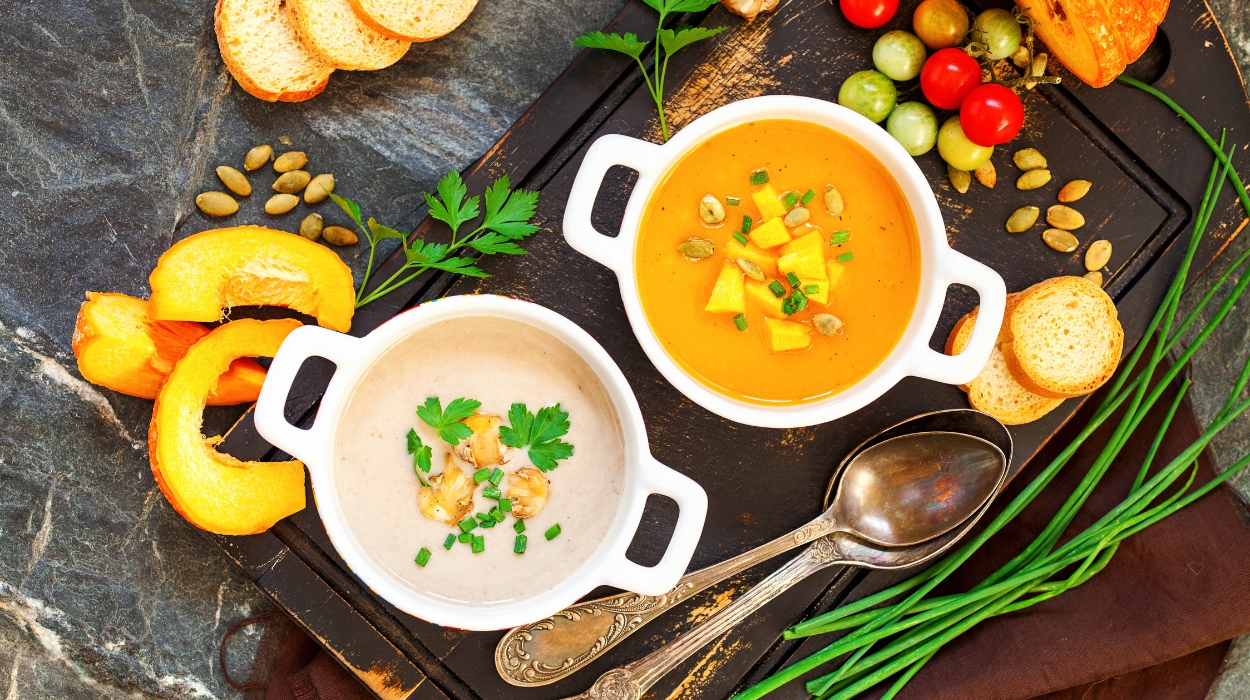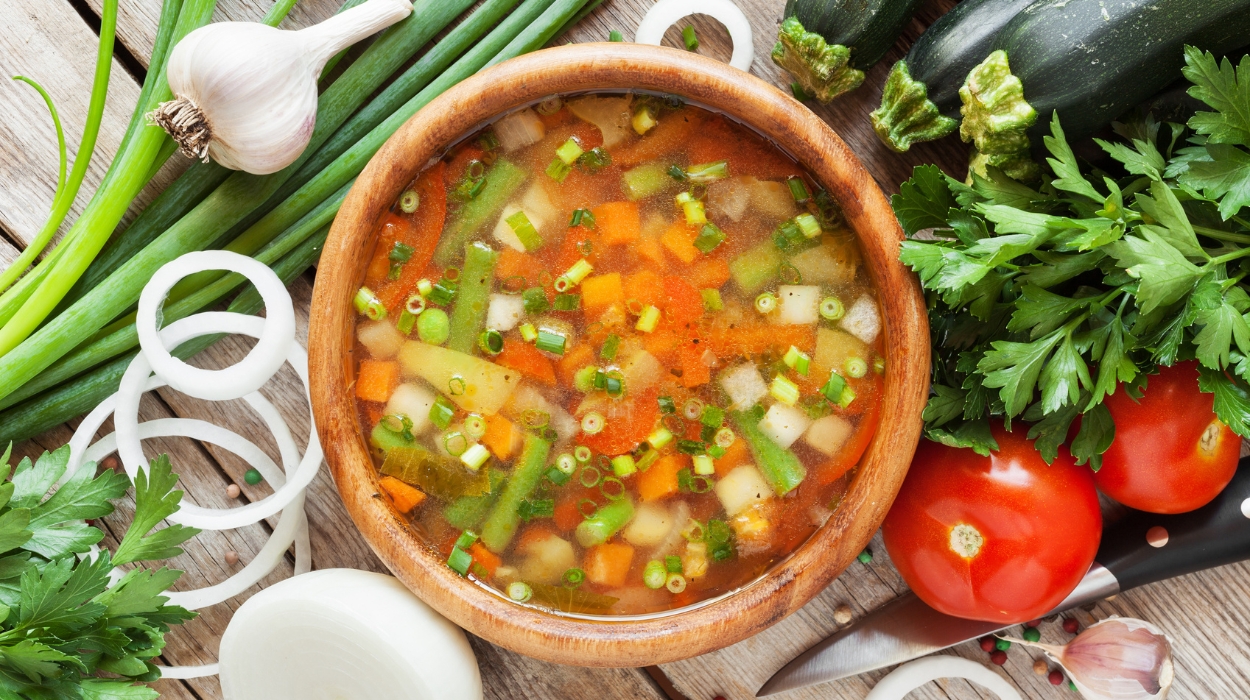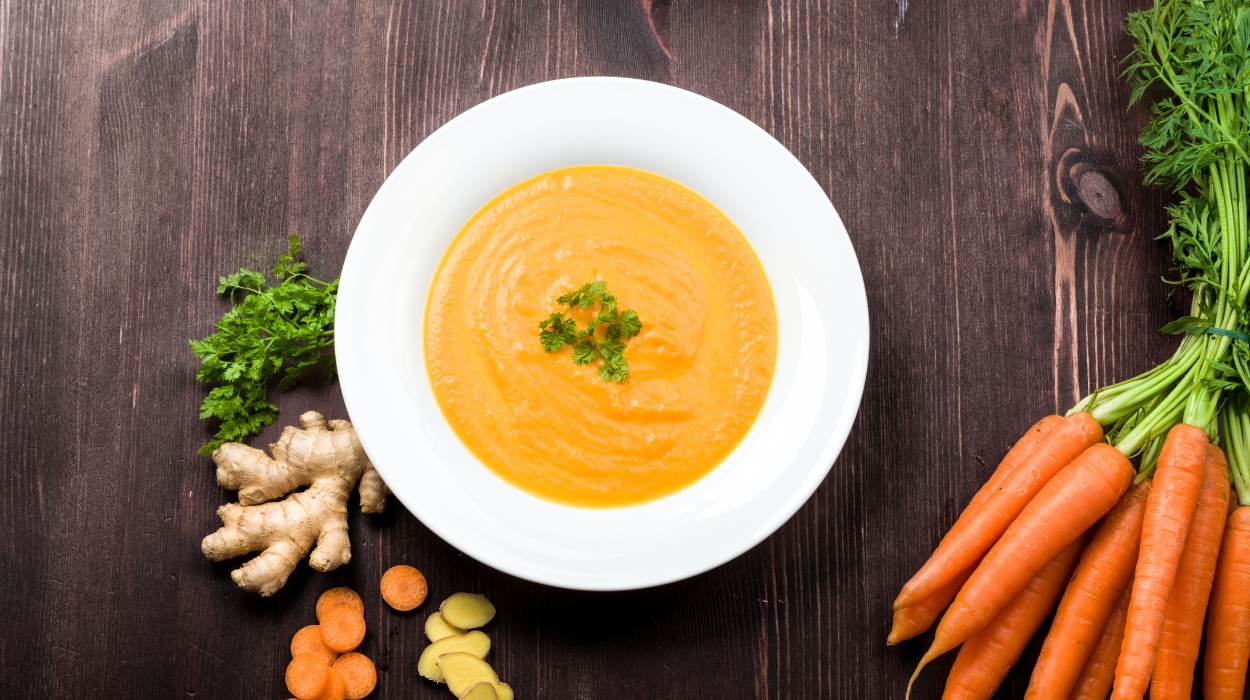 Expert's opinion
Expert's opinion
Expert's opinion
The article is a subjective view on this topic written by writers specializing in medical writing.
It may reflect on a personal journey surrounding struggles with an illness or medical condition, involve product comparisons, diet considerations, or other health-related opinions.
Although the view is entirely that of the writer, it is based on academic experiences and scientific research they have conducted; it is fact-checked by a team of degreed medical experts, and validated by sources attached to the article.
The numbers in parenthesis (1,2,3) will take you to clickable links to related scientific papers.
Is Soup Good For Weight Loss? The Truth About Soup Diet 2024

Soups are a common food ingredient and a nutrition powerhouse. The right type of soup recipe can help you reach your weight loss goals.
According to research, eating food in liquid form has a weight loss advantage over eating just its solid ingredients.
Eating soup is an excellent replacement for water before or after meals to increase satiety. Soup, when consumed as the only meal, keeps you satisfied for a longer period, contains few calories, and provides a healthy diet like a regular meal.
According to multiple studies, soup flavored with umami seasoning — monosodium L-glutamate, or MSG — reduces hunger,[1] limits the amount of food you eat, and reduces the desire for dessert. However, when consumed in addition to the main meal, it becomes counterproductive because it becomes a source of extra calories.
Nevertheless, there is still debate on whether soup is good for weight loss or the opposite.
Is Soup Good For Weight Loss?
Yes. Soup has moderate water and just enough food to nourish your body. It promotes satiety while suppressing unhealthy eating habits that contribute to obesity. Soups can contain animal and plant-based foods as long as they include the appropriate number of calories. The effectiveness of a weight-loss soup is determined by its calorie count rather than its ingredients.
How Can Soup Help You Lose Weight?
A healthy soup meal contains enough nutrients to keep all body functions running smoothly without exceeding the daily calorie intake limit. Eating soup also promotes hydration because it has a lot of water content. A typical weight-loss soup diet includes water, vegetable broth, and proteins like chicken stock.
One clinical study[2] found that adult participants who consumed soup had lower body weight, waist circumference, and energy consumption when compared to those who did not.
According to the researchers, such trends can be attributed to lower dietary energy density and higher diet quality. Studies have demonstrated that the quality of one’s regular diet may have more impact[3] than calorie restriction.
What Is The Soup Diet?
The soup diet is a weight loss eating plan that consists primarily of soup. It can be supplemented with a small amount of solid food for satiety.
For years, the soup diet has been a popular weight loss option, and through experimentation and scientific studies, it has evolved to include both plant-based and animal-based ingredients.
This weight loss diet plan is based on the idea that soup fills your stomach, suppresses hunger, and allows you to avoid overeating.
Over time, you will burn more calories than you consume, resulting in weight loss.
Types Of Soups That Are Good For Weight Loss
Consuming soups for weight loss must be done before meals to suppress your appetite and reduce your food intake or as the main meal. If you need help with losing weight with soup, the following section will explain some of the most popular soups for weight loss and how they work.
Garlic And Vegetable Soup

Garlic is best known for its ability to lower blood pressure and promote cardiovascular health. Although some clinical studies have questioned its ability to lower cholesterol, evidence suggests it positively affects cardiovascular health,[4] metabolic diseases, atherosclerosis, thrombosis, hyperlipidemia, diabetes, and hypertension.
Garlic and various nutritious vegetables, including cabbage, carrots, and capsicum, can be used in these soup-based diets.
Chicken Noodle Soup
Compared to other types of meat, e.g., primarily processed meat, chicken has the fewest calories. It is, however, high in protein, which takes longer to digest, reducing hunger and caloric accumulation.
Chicken soup diet is good for weight loss since they are low in calories, delicious, and makes a filling appetizer. According to studies, one excellent option[5] is a high protein, strained chicken broth that can be used for this and combined with other ingredients such as garlic.
Tomato Soup
Tomato soup is popular because of its acidic flavor and is suitable to accompany almost any meal. It is nutrient-dense, high in antioxidants, and vitamins A and C. According to experts, its low-calorie level aids in weight loss efforts. Combine tomato soup with coriander leaves and toasted croutons for a different flavor.
Spinach/ Cabbage Soup
Due to their high levels of antioxidants, iron, and fiber, green vegetables such as spinach are helpful in nearly all healthy weight loss diets. It contains insoluble fibers that are poorly digested, so it keeps you satisfied for longer and reduces food cravings. Insoluble fibers aid digestion as well and support a healthy gut.
Spinach soup is a good choice, but is the cabbage soup diet also good for weight loss? The answer is yes. A serving size of 100 grams of cabbage contains 2.5 grams of fiber,[6] providing similar benefits to spinach. This portion has 25 calories, 1.28 grams of protein, vitamins B6 and C, iron, and magnesium.
Bean/ Lentil And Broccoli Soup
Common questions in this category include, Can legumes be used for weight loss soup diets, and is miso soup good for weight loss? Beans, lentils, and other legumes are high in protein and make an excellent weight-loss soup ingredient.
Bean soup also has folate and antioxidants, which are healthy nutrients. One study examined the effects of beans on body fat[7] and waist circumference in 246 women. According to the researchers, women who consumed moderate to high amounts of beans had smaller waists and lower body fat percentages than those who didn’t.
Additionally, lentil soup is healthy because it contains calcium, iron, magnesium, vitamin B6, vitamin C, and — for satiety and weight loss — 8 grams of fiber[6] in 100 grams. Broccoli, a highly nutritious vegetable and a good source of fiber, can be added to a lentil or bean soup diet.
Carrot And Ginger Soup

Carrot and ginger are both naturally low-calorie foods with powerful antioxidant properties. Combining the two in soup diets will boost your immunity and help you burn calories. Carrots are high in antioxidants, and ginger has long been used to treat inflammation and certain types of infection.
Studies have shown ginger reduces waist-to-hip ratio,[8] heart rate, and body weight. It also raises good HDL cholesterol but doesn’t impact bad LDL cholesterol, BMI, or triglycerides.
Roasted Butternut Squash Soup
Butternut squash is high in vitamins, minerals, fiber, and antioxidants, aiding in weight management and overall health. It also contains beta-carotene, which converts to vitamin A in the body to improve immunity and eye health. Additionally, it contains fiber, which helps with satiety and gut health.[9]
Butternut squash balances your gut bacteria, preventing bloating, and reduces caloric intake by keeping you feeling fuller for longer.
One cup of cooked butternut squash has 45-90 calories.[10] To make the butternut more flavorful, brush it with olive oil before roasting it with coconut milk.
Are There Any Side Effects?
Weight loss soup diets are made from natural and organic ingredients in everyday foods, hence no side effects, even if you eat soup regularly.
However, nonorganic vegetables contaminated with pesticides may cause side effects or allergic reactions. As a result, you must inspect the source of your ingredients and ensure that you are not allergic to them. Artificial flavors and spices can also have minor side effects.
Foods To Avoid When Trying To Lose Weight
Avoid thick creamy soups that are likely to be fatty. Instead, choose low-calorie, high-nutritional value foods like vegetables, mushrooms, tomatoes, carrots, and chicken soups. Whole milk, butter, honey, and sauces are foods to avoid since they are calorie-dense foods.
In addition to fatty soup ingredients, you should avoid additional accompaniments like baked goods, processed meat, sugary beverages, french fries, ice cream, white bread, white rice, and white pasta. You will find that soups can stand alone as their own meals because they are delicious and filling.
Conclusion
Nutritious soup recipes can assist in meeting the daily recommended servings of fruits, vegetables, and lean protein for better health. On the other hand, a soup meal added to the main meal can be counterproductive unless the strategy is to consume it before.
Soups for weight loss are excellent starters because they fill you up and discourage overeating while providing adequate nutrients and nourishment. Eating soup for weight loss also allows you to reap the benefits of dieting without going hungry or limiting your choice of ingredients or meals.
+ 10 sources
Health Canal avoids using tertiary references. We have strict sourcing guidelines and rely on peer-reviewed studies, academic researches from medical associations and institutions. To ensure the accuracy of articles in Health Canal, you can read more about the editorial process here
- Miyaki, T., Imada, T., Susan Shuzhen Hao and Kimura, E. (2015). Monosodium l-glutamate in soup reduces subsequent energy intake from high-fat savoury food in overweight and obese women. British Journal of Nutrition, [online] 115(1), pp.176–184. doi:https://doi.org/10.1017/s0007114515004031.
- Zhu, Y. and Hollis, J.H. (2014). Soup consumption is associated with a lower dietary energy density and a better diet quality in US adults. British Journal of Nutrition, [online] 111(8), pp.1474–1480. doi:https://doi.org/10.1017/s0007114513003954.
- Lee, C. and Longo, V. (2016). Dietary restriction with and without caloric restriction for healthy aging. F1000Research, [online] 5, p.117. doi:https://doi.org/10.12688/f1000research.7136.1.
- Ansary, J., Forbes-Hernández, T.Y., Gil, E., Cianciosi, D., Zhang, J., Elexpuru-Zabaleta, M., Simal-Gandara, J., Giampieri, F. and Battino, M. (2020). Potential Health Benefit of Garlic Based on Human Intervention Studies: A Brief Overview. Antioxidants, [online] 9(7), p.619. doi:https://doi.org/10.3390/antiox9070619.
- Leidy, H.J., Clifton, P., Astrup, A., Wycherley, T.P., Westerterp-Plantenga, M.S., Luscombe-Marsh, N.D., Woods, S.C. and Mattes, R.D. (2015). The role of protein in weight loss and maintenance. The American Journal of Clinical Nutrition, [online] 101(6), pp.1320S1329S. doi:https://doi.org/10.3945/ajcn.114.084038.
- Usda.gov. (2023). FoodData Central. [online] Available at: https://fdc.nal.usda.gov/fdc-app.html#/food-details/169975/nutrients.
- Tucker, L.A. (2020). Bean Consumption Accounts for Differences in Body Fat and Waist Circumference: A Cross-Sectional Study of 246 Women. Journal of Nutrition and Metabolism, [online] 2020, pp.1–9. doi:https://doi.org/10.1155/2020/9140907.
- Maharlouei, N., Tabrizi, R., Lankarani, K.B., Rezaianzadeh, A., Akbari, M., Kolahdooz, F., Rahimi, M., Keneshlou, F. and Asemi, Z. (2018). The effects of ginger intake on weight loss and metabolic profiles among overweight and obese subjects: A systematic review and meta-analysis of randomized controlled trials. Critical Reviews in Food Science and Nutrition, [online] 59(11), pp.1753–1766. doi:https://doi.org/10.1080/10408398.2018.1427044.
- Li, H. (2020). Evaluation of bioactivity of butternut squash ( Cucurbita moschata D.) seeds and skin. Food Science & Nutrition, [online] 8(7), pp.3252–3261. doi:https://doi.org/10.1002/fsn3.1602.
- Usda.gov. (2023). FoodData Central. [online] Available at: https://fdc.nal.usda.gov/fdc-app.html#/food-details/170490/nutrients.



